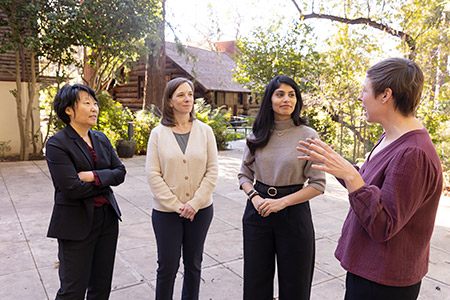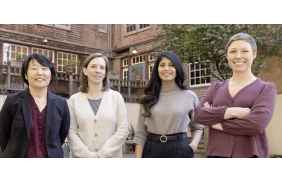Since long before she was a student at Berkeley Law, Angeli Patel ’20 knew she wanted to make a difference. Now, as the new executive director of the Berkeley Center for Law and Business (BCLB), she’s got a platform for reshaping the corporation’s role at a pivotal moment.
As a student and since graduation, Patel has been heavily involved with the center — the hub of the school’s top-ranked business law program — with a special focus on sustainable capitalism including the growing sphere of environmental, social, and governance (ESG) considerations for corporations. When the executive director’s job opened up, she couldn’t pass up the opportunity.
“I believe that BCLB can be a truly strong platform to talk about some of the most pressing issues that we’re facing. And not just in the business world, even though that’s where my expertise and my focus really lie,” says Patel, who worked in the Office of Management and Budget during the Obama administration before law school. “I’m driven by the desire to figure out how to realign incentives of our economy that lead to positive outcomes for people. And BCLB is well-positioned to bring together powerful, influential people to talk about how to do that.
“Few people get to further the dialogue on the pressing needs of our society, much less the chance to do so at the No. 1 business law program in the world. I consider myself incredibly lucky.”
Adam Sterling ’13, who took over BCLB in 2015 and led a major expansion of its programming, knew Patel well as a student and says she’s the right shepherd for the center’s next moves. He remains involved with BCLB but is now an assistant dean focused on executive education and revenue generation.
“Thanks to her incredible background — as a White House administrator, ESG attorney, and instructor at Berkeley Law — Angeli is the ideal leader to take our program, and business law, into the future,” he says.
Patel is one of four new executive directors at some of the school’s biggest and most impactful centers — all of them women. She joins Betsy Popken(opens in a new tab) at the Human Rights Center(opens in a new tab) (HRC), Louise Bedsworth at the Center for Law, Energy & the Environment (CLEE), and Christina Chung(opens in a new tab) at the Center for Law and Work (CLAW) as leaders with big ambitions for taking on critical issues, spanning California and the globe.
A global perspective on human rights
At HRC, a lodestar in the international human rights arena for almost three decades, Popken joins longtime leader Alexa Koenig ’13 as co-executive director. She arrived with a broad and deep background in human rights advocacy and law.
Most recently, Popken co-founded and co-led the business and human rights practice at Orrick, Herrington & Sutcliffe, and helped launch that firm’s ESG practice. She’s also worked on United Nations-mediated peace and ceasefire negotiations in Sudan, Syria, and Yemen through the Public International Law & Policy Group, and led the organization’s office in Istanbul.

Popken has also taught negotiations at Stanford Law School and worked for the U.S. Department of Homeland Security and the Pacific Council on International Policy. She’s currently a term member of the Council on Foreign Relations, and will teach a fall seminar in Tech and Human Rights at Berkeley Law.
“The Human Rights Center’s leadership and expertise in the area of human rights and technology excites me,” Popken says. “We have such a knowledgeable and passionate team that I am inspired to work with.”
Koenig, moving into an appointment as co-faculty director with Eric Stover, says they’re thrilled to bring Popken on board at HRC, which continues to grow its work along with its influence. The center’s Berkeley Protocol on Digital Open Source Investigations(opens in a new tab), developed in partnership with the Office of the U.N. High Commissioner for Human Rights and released in English in late 2020, is quickly becoming an indispensable tool for documenting human rights violations worldwide as it’s translated into multiple languages. Other collaborations, including a flagship open source investigative reporting course with the UC Berkeley Graduate School of Journalism, and the center’s cross-campus Afghan Scholars Program, have added more perspectives to the work.
“Betsy’s breadth of experience and diverse perspectives on human rights is truly stunning — ranging from frontline to government to legal practice — making her an ideal person to lead our multidisciplinary team into its next decade,” Koenig says.
Centering the climate crisis
Bedsworth came to CLEE in 2021 as director of its Land Use Program and senior advisor to its California-China Climate Institute. She had spent almost a decade working for the state of California, as executive director of the Strategic Growth Council and deputy director of the Office of Planning and Research under then-Gov. Jerry Brown.
Bedsworth has also worked at the Public Policy Institute of California, the Union of Concerned Scientists, Redefining Progress, and the International Institute of Applied Systems Analysis.
“We had other very strong candidates,” says Professor Daniel Farber, CLEE’s faculty director, “but Louise stood out for the range of the strengths that she’ll bring to the job.”
As Berkeley Law’s hub for energy and environmental law and policy, CLEE has focused on four main areas: climate, water, oceans, and land use. The center draws on experts across the UC Berkeley campus to help craft pragmatic, creative policy solutions to build a more resilient and sustainable world.
One of Bedsworth’s big goals is to make sure combating climate change is at the core of everything her team does.
“I’ve been thrilled to lead CLEE at this important moment, as the urgency and evidence of the climate crisis grows each day. CLEE has forged a tremendous reputation as a source for thoughtful and practical solutions for complex environmental challenges,” she says. “I’m excited to build on this strong foundation to continue to grow CLEE and advance Berkeley Law’s leadership in environmental law.”
Carving a new niche
Chung also came to Berkeley Law with an impressive resume reflecting her extensive work and expertise on issues of economic justice for low-wage workers. After nearly 25 years in public service and at nonprofit legal and civil rights organizations, she recently joined the Center for Law and Work as its founding executive director. The center was launched by Professors Catherine Fisk ’86, Catherine Albiston ’93, and Lauren Edelman ’86 in late 2020, and is now poised to hit the ground running with Chung at its helm.
A seasoned litigator and policy advocate appointed to state positions by Brown and Gov. Gavin Newsom, Chung was the top advisor to the California Labor Secretary and Labor Commissioner. In that role, she directed and shaped policy for the nation’s largest labor agency, including drafting model laws and policies for low-wage workers and immigrant workers.
Fisk, a faculty director of the center, says Chung is a perfect fit because of the breadth of her career, as a creative and pathbreaking lawyer advocating for the rights of all workers, and especially immigrants, impoverished people, and people of color who toil in the most difficult, dangerous, and important low-wage jobs.
“She knows an extraordinary amount about the wide range of California labor laws and the state’s legislative and administrative process,” Fisk says. “And she knows a huge array of lawyers and community activists in California and nationally.”
With an emphasis on race, class, gender, and immigration status, Chung and the center’s faculty leaders have already started engaging in cross-disciplinary efforts aimed at building an innovative law and policy platform that advances worker equity, and that utilizes insights gained in California as a springboard for national models.
“We’re excited to establish CLAW as a leading voice in the larger movement for labor rights and economic justice for workers,” Chung says. “We’re ambitious in what we want to accomplish. That is what this moment demands, when there is so much peril facing workers today, yet so much promise in what we can do if we harness our collective intellect, energy, and creativity.”
Mission-driven
Impact is what drew Patel to the BCLB job, too. Two years after graduation, she says she was at a point in her personal journey where she wanted to be clear about how she was using her time and her potential — and that it needed to be something that was helping not just individuals on a one-time basis, but shaping whole systems to do so.
The business world should be a place where conversations about innovating to meet society’s needs are happening, Patel adds. So far, the discussion about the role of corporations has stayed mostly in business schools, but she says it’s time law schools got engaged as well and that BCLB is the perfect place with its deep roster of talented professors and bright, creative, and activated students.
“I was asking, ‘What’s my place in this world, what’s my role in a changing society?’ and this position spoke to me,” Patel says. “This is where I want to be, in the kind of place where we’re talking about the issues and we’re sitting together and coming up with solutions.
“I feel like there’s a mission for me here.”




